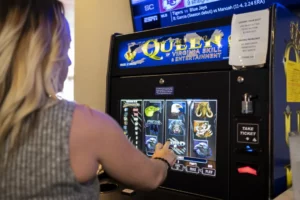
by Dick Hall-Sizemore
With his proposed amendments to legislation regulating “games of skill,” Gov. Youngkin has demonstrated deep inconsistencies, if not outright hypocrisy.
Before getting into the specifics, a little background is needed.
“Games of skill” are machines on which people can play and win money. The proponents of the machines claim that some element of skill is needed to win. The opponents claim that the machines are not that different from slot machines, in which pure luck is involved. Not having played any “games of skill,” I am not going to offer any judgment on this argument.
Skill games are present in many, if not most, convenience stores, truck stops, and even some sit-down restaurants, such as the Kelly’s Tavern franchise in Virginia Beach. The machines themselves are owned by large corporations, mostly from out of state. The owners of the venues receive an agreed-upon share of the revenue generated by the machines. The revenue can be significant and many of the businesses have come to depend on it.
The opponents of the machines cite the dangers of gambling and the fear of people becoming addicted to gambling; never mind that the Virginia Lottery has been around for almost 40 years and the Commonwealth now allows betting on horse races (with machines depicting races in the past), sports betting, and the establishment of casinos.
Democrats in the General Assembly have also engaged in the hypocrisy regarding skill games. In 2021, they passed legislation banning the games. Then they allowed them to stay in place in order to bring in revenue during the pandemic. After that, the ban was challenged in the courts. In the meantime, the ban was lightly enforced. The Virginia Mercury provides more detail on the fighting over this issue here.
In addition to those who sincerely oppose the expansion of legalized gambling, a lot of the opposition to skill games has come from casino operators who don’t want any competition for the money of people who want to gamble.
Strong support for the skill games has come from organizations representing the small businesses that have had them on site in the past.
In probably the most heavily-lobbied issue of the past session, the General Assembly passed legislation that authorizes skill games, regulates them, and taxes the revenue. (SB 212—Rouse, Virginia Beach.) The governor has returned the bill with several pages of amendments that constitute a substitute bill.
There are many provisions in the governor’s substitute that cause consternation among proponents of the bill, but this article will focus on three.
- Local option. The proposed amendments allow a local governing body to pass an ordinance prohibiting the presence of skill games in the jurisdiction or it may hold a referendum on the question. Also, a referendum must be held if a specified number of citizens petition for it. Contrast this provision with the governor’s veto of legislation authorizing a local referendum on raising the sales tax to support renovation or construction of schools. (HB 805 [Rasoul, D, Roanoke] and SB 14 [McPike, D, Prince William]). Youngkin is willing to allow a local referendum to prohibit something he does not like, but he is not willing to allow a local referendum to adopt something he does not like.
- Tax increase. The adopted bill would have imposed a 25 percent tax on earnings from skill games. The governor’s amendment would increase that tax to 35 percent. A governor who has frequently voiced his opposition to tax increases, saying that he wants the citizens of Virginia to keep their hard-earned money in their own pockets, now proposes to increase a tax on small businesses.
- Protection of vested interests. Perhaps the most outrageous provision proposed by the governor is one that prohibits the presence of skill games within 35 miles of any casino or racetrack or satellite facility. Obviously, the governor is not trying to protect Virginia’s citizens from the dangers of gambling; his main object is protecting the profits of casinos and racetracks. In addition, there are limitations on how many machines can be in a single facility and the number of skill games statewide is capped at 20,000. The governor’s spokesperson revealed one of his major concerns was the “impact on the Virginia Lottery.”
So much for consistency and principle.

Leave a Reply
You must be logged in to post a comment.